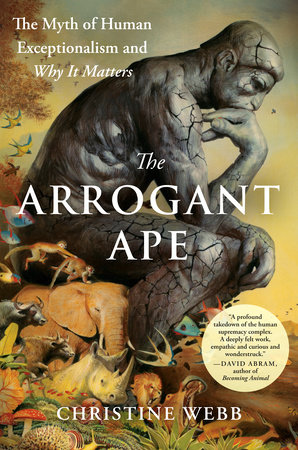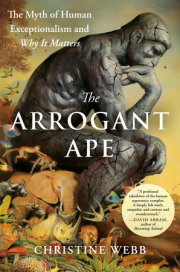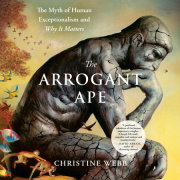"Webb debuts with a persuasive and accessible critique of anthropocentrism. She urges humans to relinquish their self-inflated top-dog status and recognize the symbiosis among organisms. As global warming and wildlife destruction threaten planetary health, Webb makes a convincing case for humility."—Publishers Weekly
"Christine Webb explores in her excellent new book that a pervasive belief in human exceptionalism is wrong. As she shows, data supporting the supposed chasm between human and animal intelligence has been systematically rigged in our favor. Convincing.”—William Egginton, The New York Times Book Review
"Exciting. What Webb advocates is nothing short of a Copernican-level revolution.”—Sy Montgomery, The American Scholar
"Inspiring and potentially life-changing. After reading Webb’s book, it is hard to think of nonhuman animals in the same way. What makes Webb’s account novel and fresh is the sheer wealth of detail that she offers about the capabilities of nonhuman animals, and her use of that detail to support her plea for humility and awe. Her ultimate goal for arrogant apes, including scientists, is resonant. It is nothing less than a re-enchantment of the world."—Cass Sunstein, Democracy Journal
"In the grand story of evolution, the crowning human distinction is our big brain. The remedy to our ecological crisis, the author believes, is embracing a trait that is often undervalued: humility. In reawakening ourselves to the wondrous diversity of nature, we might become more willing to preserve it."—Kermit Pattison, Harvard Gazette
“Christine Webb's powerful new book is both a carefully crafted unpacking of the errors behind human exceptionalism and a practical guide to how we can unlearn our species arrogance. She draws from her intimate knowledge of great apes and a deep and evidenced empathy for other living beings. Building on the legacy of her mentor, Frans de Waal, Webb's book is a passionate call on us to shape a better world as the humble apes of the future.”—Melanie Challenger, author of How to be Animal
“In her landmark book, Christine Webb makes clear that the notion that we're the most important show in town—smarter than, better than, more important than, uniquely exceptional, above, and separate from other animals—has got it all wrong. This distorted view of humans in which we use ourselves as some sort of standard to which individuals of other species should strive is not only arrogant, but singularly ill-informed. I highly recommend The Arrogant Ape. We need a new mindset, a paradigm shift in which we decenter ourselves and work alongside other species to change the dismal road on which we are currently and recklessly traveling.”—Marc Bekoff, author of The Emotional Lives of Animals
“The Arrogant Ape is a multidisciplinary takedown of anthropocentrism. Bursting with vivid firsthand accounts of encounters with wild animals and a survey of cutting-edge research into animal cognition, Webb offers a deeply considered, self-reflective, and undeniably philosophical approach to the scientific study of animal behavior. Christine Webb is spearheading a paradigm shift in science; deftly folding in Indigenous and phenomenological perspectives to forge a hybrid approach to empirical knowledge-seeking. Her book is a modern exploration of the ancient speciesism problem, leading the reader toward a hopeful appeal that we can dispel our culturally acquired forms of anthropocentrism in service of a humbler path to understanding both the animal mind and humanity’s connection to the natural world. Webb will leave you in awe.”—Justin Gregg, author of If Nietzsche Were a Narwhal
“A thrilling, disconcerting, ultimately hopeful exposé of our species’ self-regarding prejudices. Webb puts us in our place (and a fine place that is, in fact), showing us how much more fascinating the world is if we see it as it is, rather than denigrating it and using it as a mere resource. A crucial and transformative read.”—Charles Foster, author of Cry of the Wild
"Christine Webb is the informed and ethical voice we urgently need. The Arrogant Ape convincingly argues that humans need not—even should not—be placed central to every discussion in science, in policy, or in considering how to live one's life. This book will reframe the way you view animal welfare, and may even reframe the way you see."—Alexandra Horowitz, author of Inside of a Dog
"The Arrogant Ape is among the best books I've ever read on what it means to be a human animal—perhaps, simply, the best book."—Rob Dunn, author of Never Home Alone
"A brilliant book filled with insights into the living world we inhabit of diverse intelligences, forms of language, sensory feats, and entangled relations. Webb makes a powerful case against the bias of anthropocentrism that blinds us to Earth’s reality by making 'man the measure of all things.' In choosing to relinquish this delusion we become more virtuous, we acquire more valid knowledge about nature, and we give ourselves the chance to live in graceful coexistence with all life. A must-read on matters of critical importance at this pivotal moment for humanity and Earth."—Eileen Crist, author of Abundant Earth
“Lively, engaging, and provocative. The Arrogant Ape shows that all too often our view of other species is based on a mistaken sense of superiority. Webb’s colorful call for a more realistic attitude to humans’ place in nature provides an ideal introduction to the far-reaching problems of anthropocentrism.”—Richard Wrangham, author of Catching Fire
“We humans have a favorite story: We are different, we’re the best; in this world, we matter most. It’s a myth we’ve fallen for. With insights gained through a lifetime of intimately observing our primate relatives, Christine Webb unpacks the myth and diagnoses the dilemmas it’s causing. She offers us a different reflection when we look in the mirror, and charts for us a saner path for nature and ourselves, offering us a kind and hopeful way forward.”—Carl Safina, author of Alfie and Me
“A brilliant and moving invitation to rethink the illusory human-animal divide. In these vivid stories and incisive reflections, we come to see not only how blinkered we have often been but, more importantly, how we can expand experience, deepen science, and open imaginations when it comes to our relationships with other animals. A must-read for all who love the more-than-human world."—David George Haskell, author of Sounds Wild and Broken
"A gifted primatologist, Christine Webb undertakes a profound take-down of the human supremacy complex. She accomplishes this not by arguing that our species is unexceptional, but by showing that every species is marvelously exceptional—each creature enacting its own uncannily weird way of relating to the rest. The Arrogant Ape is not only lucidly thought and eloquently articulated; it's a deeply felt work, empathic and curious and wonder-struck. It opens us onto a more humble and collaborative natural science—one that engages nature not as a quantifiable set of mechanical objects waiting to be figured out and mastered, but as a collective of often-incommensurable yet oddly intersecting styles of sentience, a breathing community of subjects to whom we can only apprentice ourselves.”—David Abram, author of Becoming Animal and The Spell of the Sensuous
"A glorious upending of the pervasive cultural, psychological, and biological myth of human exceptionalism. Instead of a loss for the human species, Christine Webb’s beautiful book offers a gift: the re-enchantment of our connection with the earth and all of life. Here is a path to the reclamation of wonder, awe, and our deepest, most authentic intelligence."—Lyanda Lynn Haupt, author of Rooted and Crow Planet








